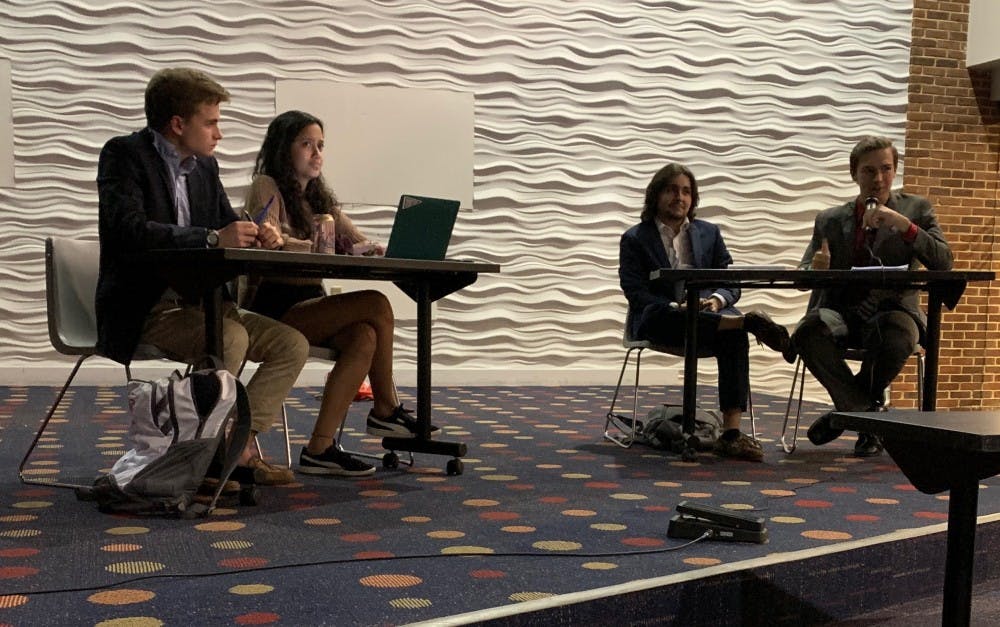Despite taking place in the shadow of an impending “Cellar Wednesday,” pizza and politics dominated the Tyler Haynes Commons on Wednesday night.
The University of Richmond College Democrats and College Republicans held a debate organized with help from the UR Politics Club, which provided the pizza.
Senior Jacob Lamar, co-president of the Politics Club, moderated the debate.
The College Democrats were represented by sophomores Val Zuluaga and Riley Place, who is the president of the club.
Sophomore Carl Wagner represented the College Republicans alongside junior Rob Papandrea, chair of the club. Wagner noted he was not an official member of the College Republicans, but said he agreed with them on many issues.
The first issue centered on potential actions from policymakers and activists in regard to gun violence in the U.S.
“I think enforcing laws that we already have is the best and least controversial step we can take,” Wagner said. “I know a lot of people that buy guns either buy them illegally or buy them because institutions that are in place to make it illegal for them to buy guns are not being properly enforced.”
Papandrea echoed Wagner’s sentiments, explaining that legally owned firearms were not the issue and that focusing on reducing illegally purchased guns would help reduce gun violence.
Zuluaga disagreed, arguing high-capacity weapons should be controlled with policy changes.
“We, the Democratic Party, believe in comprehensive gun reform rather than just adhering to the laws that already exist,” Zuluaga said. “Just as our technology has changed and we now have these weapons of mass destruction available in our hands, our laws have to adapt and change with them, and we can no longer adhere to these outdated laws.”
Next, the two sides debated immigration, focusing on the potential wall along the U.S.'s southern border.
“You’re wasting billions of dollars on building a wall that is ineffective and will basically serve as a monument that counters the welcoming message of that on the Statue of Liberty,” Place said.
Enjoy what you're reading?
Signup for our newsletter
Papandrea countered Place’s point, arguing the only waste of money came in the delay from Congress to finalize the proposed wall.
“The money has been earmarked for well over three decades to build some form of border protection on top of what already exists,” Papandrea said.
Zuluaga said the wall would not be an effective solution because many immigrants were coming through alternate methods.
“If you look at the statistics, not that many are coming from actual illegal border crossings,” Zuluaga said. “Many are coming legally and overstaying on tourist visas and working visas, like the Einstein visa, which is what Donald Trump used to get his own wife into this country.”
Wagner said he wanted to emphasize that the Republican Party was not seeking to end all immigration practices, just the illegal ones.
“The Republican Party has, to the best of my knowledge, always supported legal immigration," Wagner said, "and I suspect they will continue to support the legal immigration because it’s what made this country great.”
The final topic debated by the two sides was the environment, as Lamar asked what should be done in regard to climate change, and to what extent it is caused by humans.
Both of Wagner’s parents are biologists, and he said he was pleased that the majority of the Republican platform now accepted climate change as a real issue. Nuclear energy was one potential solution he offered.
“Nuclear energy is my number one favorite source of energy creation,” Wagner said. “At the moment the U.S. has 60 nuclear power plants which produced 19% of our energy, so pretty darn efficient.”
Place agreed with Wagner on nuclear energy but voiced concern about fusion reactors.
“We’re in this terrible bottleneck where at the beginning of this century we realized we are destroying our natural resources and biodiversity and our communities,” Place said. “Yet between these two periods of realization and technological actualization, we are creating insane disruption, and it is costing the American people and global citizens enormous amounts of money.”
A market-based system in which the government sets carbon fees, gas fees and cap-and-trade systems to ensure the cost of carbon pollution matches the monetary contribution would be an effective solution, Place said.
Papandrea questioned the feasibility of implementing a cap-and-trade system.
“If you look at patterns over the last 25 years, whoever is in the party that isn’t in power always wants a cap-and-trade system,” Papandrea said. “And as soon as they get in power, it’s just not feasible.”
According to the Environmental Defense Fund, a cap-and-trade system caps greenhouse gas emissions, becoming stricter over time. It also allows companies to emit a certain amount of carbon pollution by buying allowances.
A lot of people were worried the debate was going to turn into bickering and arguments, said sophomore Jonathan Gandara, who attended the debate.
However, Gandara said that after listening to both sides, he thought they had handled the questions very well and he was excited for potential future debates.
Sophomore Mia Dini was also in attendance, and said the event was important to foster civil discourse among peers.
“When we hear about it at the national level, a lot of times it can go over our heads because we don’t understand all the bills and the policies,” Dini said. “So hearing it from peers can really help you solidify your own views, especially now that a lot of us will be voting for the first time.”
Contact sports editor C.J. Slavin at cj.slavin@richmond.edu.
Support independent student media
You can make a tax-deductible donation by clicking the button below, which takes you to our secure PayPal account. The page is set up to receive contributions in whatever amount you designate. We look forward to using the money we raise to further our mission of providing honest and accurate information to students, faculty, staff, alumni and others in the general public.
Donate Now



